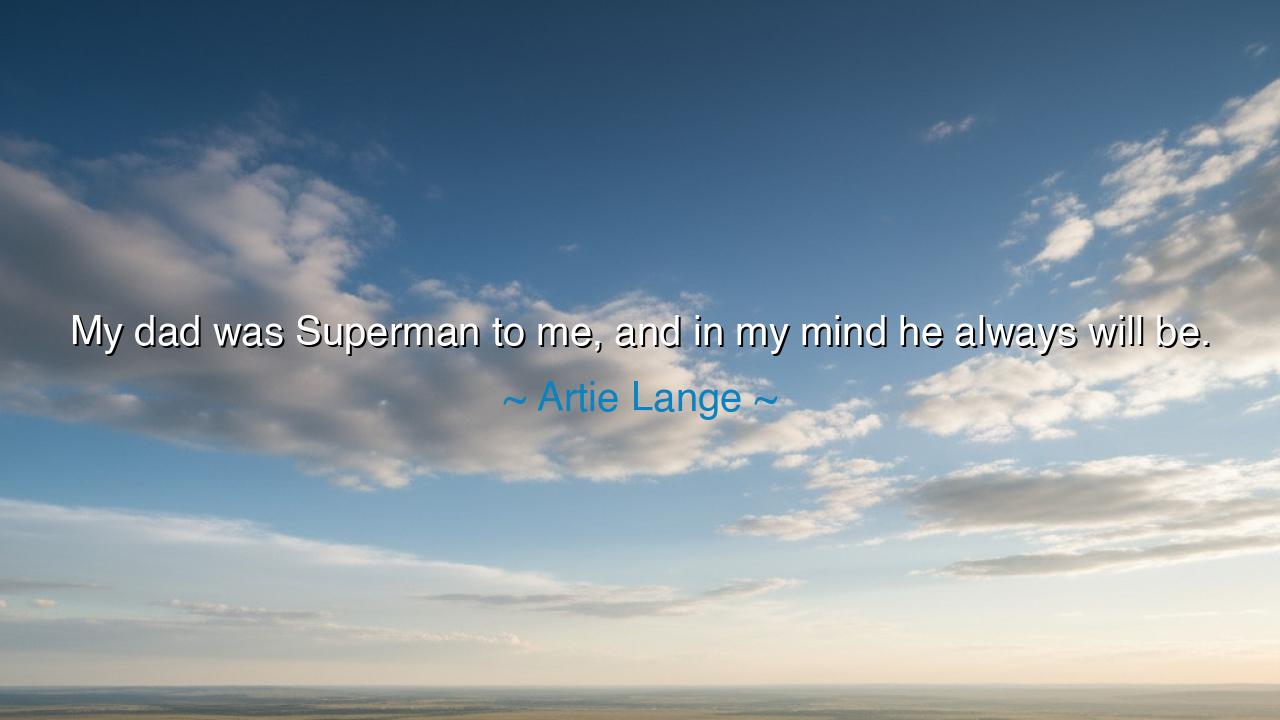
My dad was Superman to me, and in my mind he always will be.






"My dad was Superman to me, and in my mind he always will be." Thus spoke Artie Lange, not with the voice of fame or jest, but with the trembling reverence of a son remembering his father. Beneath these simple words lies a truth that crosses all generations—the eternal reverence of the child for the one who first taught them strength, courage, and love. To call a man Superman is not to say he could fly or bend steel, but that he carried the world upon his shoulders with quiet might, that he stood as an unshakable pillar in the eyes of one who looked up to him.
The father, in the imagination of a child, is the first hero—the first protector, the first teacher, the first example of what it means to be strong. His hands may be scarred, his back bent with labor, his words few and firm—but to the young heart, he seems invincible. The child does not yet see his flaws; he sees only the courage with which his father faces the world, the endurance that seems eternal. To say, “He was Superman to me,” is to confess that one’s first vision of strength was human, yet divine in spirit.
In the story of Lange’s life, this statement bears even deeper weight. His father, a construction worker and devoted man, was injured in an accident that left him paralyzed. Yet even then, he remained strong—working, teaching, and smiling through pain. To young Artie, his father’s strength was not in his body but in his will, not in what he could do, but in what he refused to surrender. When he says, “In my mind, he always will be,” he declares something holy: that true greatness does not die when the flesh weakens—it lives forever in the spirit of those who witnessed it.
So it has been since the dawn of time. The ancients spoke of heroes and demigods, but their truest heroes were often their fathers and mothers—the ones who tilled the soil, fought the storms, and built homes of safety in a world of uncertainty. To the Greeks, Heracles lifted mountains; to the humble man, a father lifting his child was no less divine. Every generation must come to learn that heroism does not belong only to myth—it lives in the quiet endurance of those who love deeply and give endlessly.
Consider the story of Atticus Finch, the steadfast father of To Kill a Mockingbird. He was no warrior, no titan of strength, yet he stood before prejudice, before the judgment of men, and did what was right. His courage was moral, his strength invisible yet unbreakable. To his daughter Scout, he was a kind of Superman too—not because he fought with fists, but because he faced the darkness of the world with truth as his weapon. Such fathers teach us that might lies not in conquest, but in character.
The words of Artie Lange are not only a son’s tribute—they are a reminder to all who bear the name of father, mentor, or guardian. To be a Superman in a child’s eyes is not to be flawless, but to be faithful. It is to show love even when weary, to protect even when afraid, to rise again after every fall. The world does not need perfect fathers—it needs fathers who are present, fathers whose strength is not in their power, but in their perseverance.
And for those who listen, there lies a lesson to carry forward: honor your heroes, but also learn to see the humanity within them. Remember the ones who shaped you—their sacrifices, their unspoken dreams, their silent battles. And when your time comes, become that strength for others. Stand as your fathers stood; love as they loved; endure as they endured. For in doing so, you continue the legacy of all who were once called Superman—not for what they could do, but for the greatness they inspired in those who believed in them.






AAdministratorAdministrator
Welcome, honored guests. Please leave a comment, we will respond soon